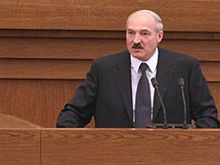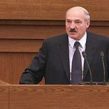
Belarus Survey Reveals Changes in Public Mood
Publication: Eurasia Daily Monitor Volume: 5 Issue: 238
By:

The warming relationship between Belarus and the European Union has given rise to discussions about whether a new dialogue is possible under Belarusian President Alyaksandr Lukashenka. It also leads to questions about the link between the world financial crisis and the more conciliatory attitude in Minsk. An equally important but often ignored factor is whether Belarusian society supports the new direction and whether the government will remain the sole decision-maker for future policies.
From the official standpoint, Belarus is well-placed to withstand the effects of the world crisis. The growth rate from January through November was reported to be 10.8 percent, with an anticipated 7 percent rise in GDP in 2009 (Reuters, December 9). In other respects, however, the outlook seems less optimistic. Inflation has risen to 12 percent compared with 9.4 percent last year. The Belarusian currency continues to fall—the rate was BR 2,200 to the dollar last week in Minsk and even worse in other cities. The price for imported gas from Moscow seems certain to rise above Belarus’s desired price of $140 per thousand cubic meters (Belapan, December 11). Equally critical is whether Russia will reduce purchases of Belarusian goods, particularly machinery and tractors, which would make the country’s impressive industrial output somewhat meaningless.
On the surface, the country seems bent on a new pro-European direction. On Belarusian Television on December 11, an earnest Lukashenka was shown in a conversation with the departing Ambassador Extraordinaire and Plenipotentiary of Italy to Belarus, Norbert Cappello. The Belarusian president lauded Italy’s role in improving relations with his country and stated that Belarus was ready for an open-ended dialogue with the EU, but without prior conditions (ITAR-TASS, Belarusian Television, December 11). A new official of the European Commission in Belarus was formally approved the next day (Interfax, December 12).
The Belarusian opposition, conversely, believes that the Belarusian authorities should not be permitted to ignore human rights. Alyaksandr Milinkevich, leader of the For Freedom movement, said that when European officials—Pirkko Tapiola and Helga Schmidt, advisors to EU Commissioner for Foreign Policy and Security Javier Solana—arrived in Minsk on December 16 for further talks, he intended to raise the issue of some political prisoners remaining in jail, repressive measures generally, and the need for the government to register nongovernmental organizations (www.naviny.by, December 2). Assuming that the forthcoming dialogue includes the opposition, support for the pro-European orientation in theory should be broad, as organizations such as Charter 97 regularly display the EU flag at opposition rallies and have long advocated that Belarus join European bodies.
A recent survey suggests, however, that the public within Belarus is far less certain about this political direction than might be expected. A state-wide survey conducted in October 2008 by the Independent Institute of Social-Economic and Political Research included two questions that examined the attitudes of Belarusians toward the EU and Russia. Asked how they would vote if there were to be a referendum today on joining the EU, 36 percent were in favor and 39.1 percent opposed, while 14 percent said they would be reluctant to vote on such an issue. In a hypothetical vote between association with the EU and one with Russia, 48.1 percent favored a link with Russia and only 31.1 percent preferred one with the EU (www.iiseps.org, Oct 2008).
Even more revealing of where Belarusians stand was the traditional question on the level of trust for state and public institutions, an area in which the president’s support has traditionally been very high and that of the government quite low. The survey revealed that the Orthodox Church retains the highest level of public confidence at 64.5 percent, followed by the army at 55.4 percent. In a remarkable change, confidence in the president and in the government is now about equal at 50.6 percent and 50.1 percent, respectively. Finally, confidence in pro-government political parties was well down the list at 27.7 percent but ahead of that of opposition political parties at 17.7 percent (www.iiseps.org, Oct 2008).
How does one evaluate such responses? One explanation is that the more radical economic changes and pro-investment policies favored by Prime Minister Syarhey Sidorski are becoming more appealing than those of the president, who prefers strong state intervention in the economy. The Belarusian public may still prefer a law-abiding society that can steer clear of international crises. By and large, democratic changes are not high on the agenda, but the public recognizes the need for Belarus to open up to foreign investment and supports economic reforms. Sidorski could conceivably emerge as an alternative voice or source of power to the president, particularly if the economic situation worsens in 2009, as seems very likely. That assumes, of course, that he remains in office.
Finally, Belarusians still lean more toward Russia than to the European Union. This survey suggests that Lukashenka cannot move exclusively toward Europe but must maintain a balanced position between Brussels and Moscow. He is in a difficult position, given the forthcoming dialogue with Europe, as well as the gas price negotiations with Russia and his eagerness to avoid being a pawn in Moscow’s foreign policy. The year 2009 promises to be a pivotal one for Belarus.




